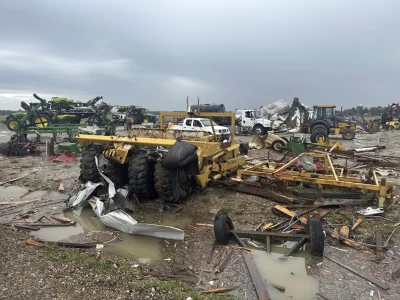
A new poll conducted by Gallup shows that one in three adults in the U.S. reported being personally affected by an extreme weather event over the last two years. The poll, which was conducted over an 18-day period last month, surveyed Americans over the age of 18 on whether or not they were personally affected by an extreme weather event, and, if so, what type.
Of those surveyed, 33% indicated that they had been affected by an extreme weather event in the last two years, with extreme cold and hurricanes ranking as the top two extreme weather types with which Americans have tangled.
This survey was the first in which Gallup, one of the most storied pollsters in U.S. history, questioned Americans specifically about their run-ins with extreme weather. According to Gallup, the results were based on a telephone survey of a random sample of 1,017 adults from all 50 U.S. states and Washington, D.C.
A spokesperson for Gallup told AccuWeather that the survey results translate to about 60 million American adults who have experienced extreme weather over the last two years. That figure rises to roughly 100 million when Americans under the age of 18 are factored in, but that is based on the assumption that non-adults experience extreme weather at the same rate. According to the U.S. Census Bureau, the U.S. population as of 2022 is a little above 330 million.
“The results of the recent Gallup poll underscore the same theme we have been seeing at AccuWeather — increasing impacts from severe weather across the country and the need for people and businesses to be informed with the most accurate weather forecasts and warnings in order to enhance safety and reduce risk,” AccuWeather Chief Meteorologist Jonathan Porter said.
Region had an impact on how participants responded to the poll questions.
Those living in the South and West were much more likely to have experienced an extreme weather event than those in the East and Midwest, according to the poll results. Of those surveyed in the South, 39% said they had been affected. Some 35% of those in the West reported being impacted by extreme weather while just 27% responded the same in the Midwest and an even lower 24% in the East.
The residents most likely to be affected by the leading category, extreme cold, were those in the South (12%). Hurricanes were also most commonly reported in the South (12%).
A woman wrapped in a blanket crosses the street near downtown Dallas Feb. 16, 2021. As temperatures plunged and snow and ice whipped the state, much of Texas’ power grid collapsed, followed by its water systems. (AP Photo/LM Otero, File)
The high number of responses for extreme cold in the South could stem from the record-breaking cold snap that caused widespread power outages throughout Texas in February 2021. Hundreds of thousands of insurance claims were filed as a result of that extreme cold, with damages estimated to be as high as $155 billion.
“Texas bore the brunt of the impact with significant damage due to citrus crop losses, power outages, water disruption, burst pipes in many of homes and businesses in addition to the loss of life,” said AccuWeather Founder and CEO Dr. Joel N. Myers in March 2021.
Many homes in Texas were not properly insulated to handle the level of extreme cold that gripped Texas during that historic cold snap. Homes were flooded when pipes burst due to the extreme cold, and some residents even had icicles form in their homes and apartment buildings, including one from Dallas, Texas, who posted a photo on social media showing icicles hanging from a ceiling fan.
At the worst of the historic cold snap, the temperature at Dallas-Fort Worth International Airport bottomed out at 2 degrees below zero in the early-morning hours on Feb. 16 as Arctic air rushed into the region.
“As the poll highlighted, Americans are facing a wide range of severe and dangerous weather including extreme cold, extreme heat, flooding, hurricanes, snow and ice storms, tornadoes, drought and wildfires, to name a few,” Porter said, adding that the AccuWeather mobile app was designed with extreme weather alerts in mind. He recommended enabling push notifications so that app users can be kept abreast of timely weather warnings, especially in the heart of severe weather season and with hurricane season approaching.







